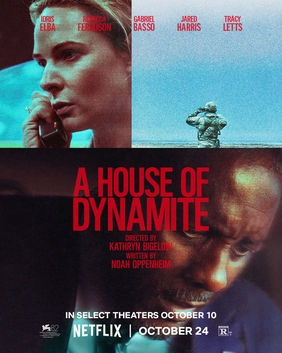Emily The Criminal - Setting as Subtext
- Ivo Raza
- Mar 21, 2023
- 4 min read
Emily the Criminal is a sparse dramatic thriller set in present-day Los Angeles. The titular character Emily is a woman in her thirties, burdened with student loan debt and a minor criminal record which prevents her from ascending in her career, any career, really. An art/design school dropout, she’s employed as a work-for-hire subcontractor at a catering company. Her living situation is not much better, sharing a cramped apartment with several people with whom she doesn’t interact. Welcome to 2020s LA. When presented with an opportunity to make some extra cash using stolen credit cards, she takes the opportunity and eventually develops a relationship with one of the guys running the scam, Yusef. Yusef, the nice guy of the bunch of scammers has an immigrant dream of his own…buying rental properties and leaving the shady criminal existence behind. He eventually gets conned by his cousin, and Emily helps him get the money back. However, when they confront the cousin, Yusef gets injured and Emily stabs the cousin to find out where he hid the cash. This prompts a swift departure and forces Emily to make a final tough decision, help Yusef or escape the situation. Emily re-emerges somewhere in South America, where she is drawing and painting again. And running a stolen credit card operation.
On the surface, this is a very simple story. But what gives the story gravitas is the subtext. Namely that the “system” aka everyday life is stacked against a significant part of the population, who like Emily, struggle to make it in an unforgiving environment because of personal problems like debt or infractions from the past. Economic hardship is certainly not new to storytelling. Most recently, Breaking Bad used it to perfection. And most of the classic noir opus was built on or around it. As a matter of fact, Emily The Criminal entails some the key elements of a noir film…an ambiguous hero with a current problem haunted by the past, financial hardship, disillusionment, and an alternative existential philosophy.
One thing that worked well in Emily The Criminal is the way Emily’s status quo is portrayed. She never complains that she couldn’t finish college, or that she’s in a dead-end job with a shitty boss. And while the story showcases Emily’s attempts of elevating her existence by going on job interviews, and simply showing her day-to-day life, and her living conditions, which are not homeless, but certainly not lavish in a generic shared home, it never hits us over the head. It simply is what it is, namely life in LA for many people with debt, gig-type jobs, and exploding housing costs. Emily never dwells on it. One can surmise she’s not loving it, but she takes it in stride, even while dreaming of escaping and traveling.
Juxtaposed to Emily’s dreary existence is her bestie who is seemingly living her best life…the life Emily should be aspiring to. She’s got an exciting job at an exciting advertising agency and about to jet off to Portugal and Spain for a multi-day photoshoot. She tasks Emily with dog sitting which plays into an episode of dread…when some scammers rob Emily and even take the dog. However, in a turning moment, Emily uses the taser Yusef gave her and gets the cash and the pup back.
Upon her friend’s return, she throws a party at her nice digs. The friend has made it…while Emily has not. However, the party hints at something else … the question if this is truly what Emily wants. While her friend’s life is something Emily aspires to on the surface, it’s possibly not a perfect match for her, because at the party, she’s lost and bored and eventually calls Yusef, with whom she has much more in common than with the agency hipsters.
Unlike her friend who happily plays her role within the symbiotic relationships of the agency employment world, Emily solidifies her role as an outsider when she rejects an unpaid internship by her friend’s boss. She’s come full circle…from being judged at a job for an assault record to rejecting an offer she deems to be an unfair exploitation.
The story ends on an ambiguous note. Emily, who has stood up for herself throughout the story convinces Yusef, who is a softer character and a bit of a pushover, to get what’s his from the cash his cousin robbed. However once that episode ends in injuries and unfortunate circumstances, Emily takes off leaving Yusef behind.
The system she lives in is unforgiving and selfish and thus she must be as well if she is to survive. In that sense, the subtext of the harsh environment serves as the impetus for her “coming of age.”
Not taking into account Aubry Plaza’s great performance, which certainly elevated the film, I think the facts of today’s life in LA with stagnating wages, impossible housing prices, the brutal gig economy, and student debt is what took this screenplay from a run of the mill crime story to a zeitgeist film.
Written and directed by John Patton Ford




